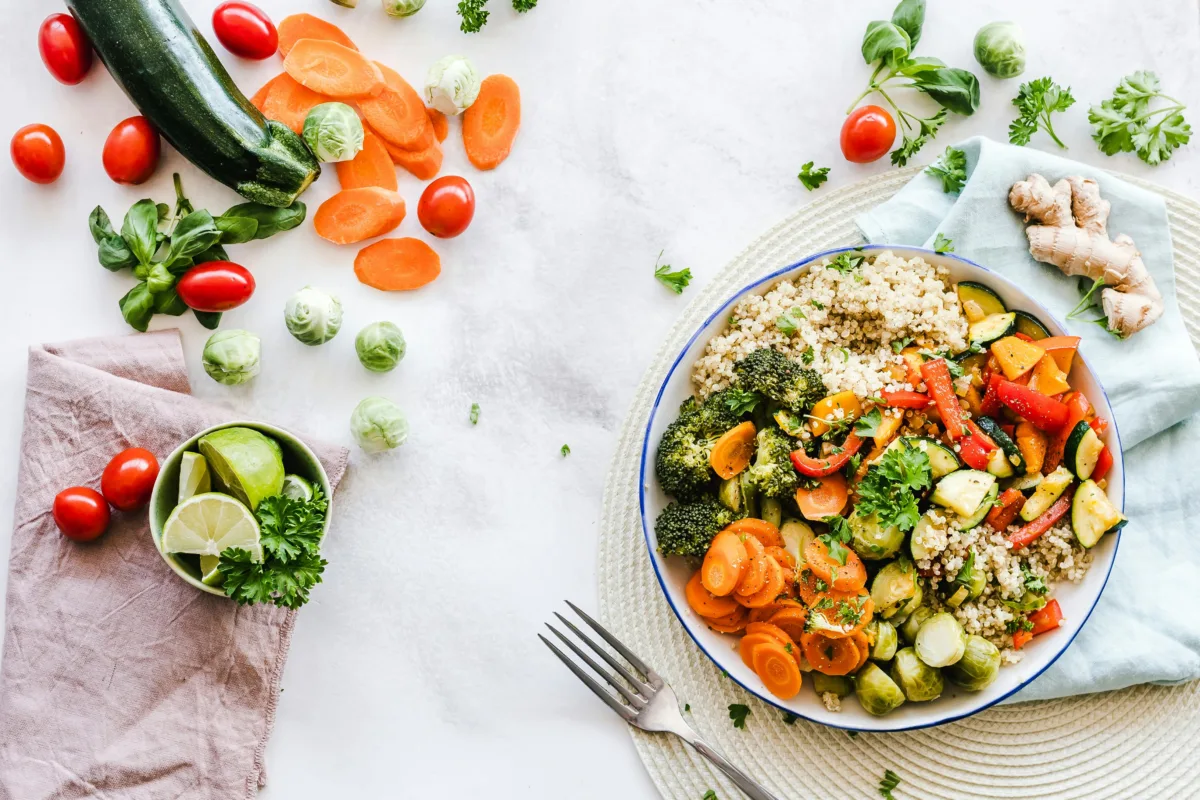✨ Introduction
In a world full of crash diets, fast food, and hectic lifestyles, it’s easy to forget the basics of good nutrition. Yet, it is this very foundation that holds the key to long-lasting health, energy, and happiness.
A balanced diet isn’t a restrictive diet—it’s a sustainable way of eating that nourishes your body with everything it needs. It’s about eating smart, not eating less. Let’s break down what a balanced diet actually means, the essential components, and the many benefits it brings to our lives.
🧩 What is a Balanced Diet?
A balanced diet refers to the intake of foods from all major food groups in appropriate proportions to maintain health and vitality. It ensures that the body gets all the necessary macronutrients (carbohydrates, proteins, fats) and micronutrients (vitamins and minerals), along with water and fiber, to function properly.
A true balanced diet supports:
- Energy needs
- Growth and repair
- Disease prevention
- Mental clarity and emotional balance
A plate representing a balanced diet often resembles the “Eatwell Plate” model—half filled with fruits and vegetables, one-quarter with proteins, and one-quarter with whole grains, plus a serving of dairy or dairy alternatives.
🍽️ Components of a Balanced Diet (In Detail)
Let’s explore the essential components one by one:
1. Carbohydrates – The Energy Source
Carbohydrates are the primary source of energy for the body, especially for the brain and muscles.
Good Sources:
- Whole grains (brown rice, oats, quinoa)
- Fruits (bananas, apples, berries)
- Vegetables (sweet potatoes, carrots)
- Legumes (beans, lentils)
Why Important?
They are broken down into glucose, which fuels bodily processes. Complex carbs provide sustained energy and aid in digestion due to their fiber content.
2. Proteins – The Building Blocks
Proteins are essential for the growth, repair, and maintenance of body tissues.
Good Sources:
- Animal: Chicken, fish, eggs, milk
- Plant: Lentils, chickpeas, tofu, quinoa, nuts
Why Important?
They help in muscle building, enzyme production, immune support, and hormone regulation.
3. Fats – Essential for Brain and Heart
Fats have long been misunderstood, but healthy fats are vital for many bodily functions.
Good Sources:
- Monounsaturated: Olive oil, nuts
- Polyunsaturated: Fatty fish, flaxseeds, walnuts
- Omega-3 fatty acids: Salmon, chia seeds
Why Important?
Fats aid in nutrient absorption (especially vitamins A, D, E, and K), protect organs, and support brain health.
4. Vitamins and Minerals – The Micronutrient Heroes
These are required in small amounts but play large roles in overall health.
Examples:
- Vitamin C (immunity), Vitamin D (bone health), Vitamin A (eye health)
- Iron (oxygen transport), Calcium (bones), Zinc (healing), Magnesium (muscle function)
Good Sources:
Fruits, vegetables, dairy, seeds, and lean meats.
Why Important?
They regulate vital processes like metabolism, immunity, cell function, and development.
5. Fiber – The Digestive Regulator
Fiber aids in digestion, supports gut health, and helps manage blood sugar.
Good Sources:
- Whole grains
- Vegetables and fruits
- Beans and legumes
- Nuts and seeds
Why Important?
It prevents constipation, lowers cholesterol levels, and maintains a healthy weight.
6. Water – The Life Sustainer
Water makes up 60-70% of our body and is critical for life.
Why Important?
- Regulates body temperature
- Aids digestion
- Helps transport nutrients
- Flushes toxins
- Keeps skin hydrated
Tip: Drink at least 8-10 glasses daily. Hydration needs may vary with climate and activity levels.
🌟 Key Benefits of a Balanced Diet
A balanced diet doesn’t just make you feel full—it empowers your body to function optimally. Here are the long-term benefits:
🏃 1. Maintains Healthy Weight
Balanced meals rich in fiber, lean protein, and good fats keep you full longer and reduce unhealthy snacking. This supports healthy weight loss or maintenance.
🧠 2. Improves Mental Health
Nutrients like omega-3s, magnesium, and vitamin B12 are linked with reduced symptoms of anxiety and depression. A well-fed brain is a happy brain.
🛡️ 3. Strengthens Immune Function
A variety of fruits and vegetables boosts your immunity through antioxidants, zinc, and vitamin C—protecting you from frequent illnesses.
🔄 4. Enhances Digestion and Gut Health
Fiber-rich foods help in digestion, regulate bowel movements, and prevent digestive issues like bloating and constipation.
⚡ 5. Increases Energy Levels
Balanced meals stabilize blood sugar levels, giving you sustained energy rather than crashes from sugary snacks.
❤️ 6. Reduces Risk of Chronic Diseases
Eating a diet high in fruits, vegetables, and whole grains lowers the risk of heart disease, diabetes, and even cancer.
💇♀️ 7. Promotes Glowing Skin and Strong Hair
Hydration, healthy fats, and antioxidants contribute to clearer skin and healthier, shinier hair.
🍏 How to Maintain a Balanced Diet: Simple Tips
- Plan your meals in advance to avoid last-minute unhealthy choices.
- Incorporate all food groups into your meals.
- Choose whole over processed foods.
- Eat seasonal fruits and vegetables for better nutrition.
- Practice portion control – avoid overeating even healthy foods.
- Avoid skipping meals, especially breakfast.
- Listen to your body – eat when hungry, stop when full.
- Stay hydrated throughout the day.
- Limit sugar, saturated fat, and salt.
- Practice mindful eating – chew slowly and enjoy your food.
💬 Final Thoughts
A balanced diet is not a short-term fix—it is a lifestyle. In a world full of misinformation and quick fixes, going back to the basics of nutrition can be a life-changing decision.
Whether your goal is to feel more energetic, prevent illness, or simply lead a healthier life, eating a balanced diet is your most powerful tool. Small changes made consistently can lead to big transformations over time.
So, start today. Eat right, live bright!

